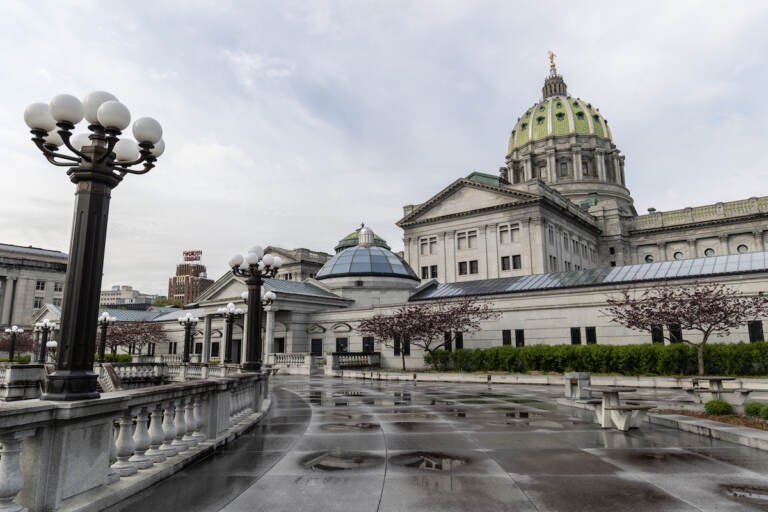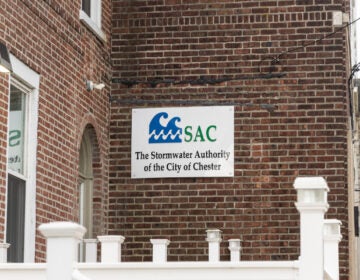Pa. House passes $15 minimum wage bill
It has an uncertain future in the Republican-controlled Senate.

The Capitol Building in Harrisburg, Pa. (Kimberly Paynter/WHYY)
Pennsylvania’s Democratic-controlled House of Representatives approved a measure by a close vote Tuesady that would raise the minimum wage to $15 by 2026, fulfilling a long-held party campaign plank that has run up against Republican legislative majorities for years.
The bill passed 103-100 with most Democrats voting for it and two Republicans joining them. But it has an uncertain future in the Republican-controlled Senate as lawmakers and Democratic Gov. Josh Shapiro increasingly focus on budget legislation ahead of the July 1 start of the new fiscal year.
Pennsylvania’s minimum wage is set at the federal minimum of $7.25, and last increased in 2009.
The measure would gradually increase the minimum wage to $15 by changing from $7.25 to $11 in its first year, then to $13 in 2025 and finally to $15 in 2026. The bill ties future increases to inflation, which sponsors say mirrors action taken by 15 other states.
The legislation would also increase the tipped wage to 60% of the minimum wage from the current $2.83 an hour. The movement comes after Democrats won a House majority for the first time in a dozen years, albeit by one seat.
It’s been a yearslong effort for Democrats, who have campaigned on increasing the minimum wage nationally.
Rep. Justin Fleming, a Dauphin County Democrat, said it was one of his priorities as a candidate. He recalled working for a former Democratic governor when the Legislature last increased the minimum wage.
“If you had told me that it would be 14 years before this body would take another stab to raise the minimum wage, I simply wouldn’t have believed it,” he said. “Passing this bill will keep workers who live close to our borders here in the state and and patronizing Pennsylvania businesses.”
Republicans emphasized concerns for small businesses and rising costs associated with raising the wage.
“I cannot support a bill that would put a local family restaurant out of business and, along with it, the many employees who make a living at their three locations,” said Rep. Katie Klunk, a York County Republican.
For some Democrats, the effort didn’t extend far enough.
“An African proverb says, ‘When elephants fight, it is the grass that suffers,’” said Dauphin County Democrat Rep. Patty Kim. “Even if we raise the minimum wage to $15 an hour, the grass still suffers. I support this bill because this is a piece to a larger puzzle that will help working families.”
Shapiro campaigned last year for a $15 minimum wage and, in his first budget address, he asked for the increase. Republican opposition stymied efforts by former Democratic Gov. Tom Wolf through his eight years in office to raise the minimum wage.
Wolf imposed higher wage requirements on companies getting loans, grants or tax breaks from the state government through an executive order in 2021. He did the same to state contractors in 2016.
All told, 30 other states and Washington, D.C., have raised the minimum wage above the federal minimum, including some Republican-controlled states, according to the National Conference of State Legislatures. Every neighbor of Pennsylvania also has raised the minimum wage, although Ohio’s law exempts lower-earning businesses and employees under 16.
June is budget month in Pennsylvania’s Legislature and often a time for deal-making on pet policy priorities between governors and top lawmakers.
Senate Majority Leader Joe Pittman, R-Indiana, said last week that his caucus would wait for the House to pass a minimum wage bill to consider it. However, he said, “$15 an hour is not a practical number” for Republicans in that chamber to consider.
In a deal with Wolf in 2019, the Senate agreed to raise Pennsylvania’s minimum wage in four steps to $9.50 in 2022, but the House’s Republican majority blocked it.
WHYY is your source for fact-based, in-depth journalism and information. As a nonprofit organization, we rely on financial support from readers like you. Please give today.





